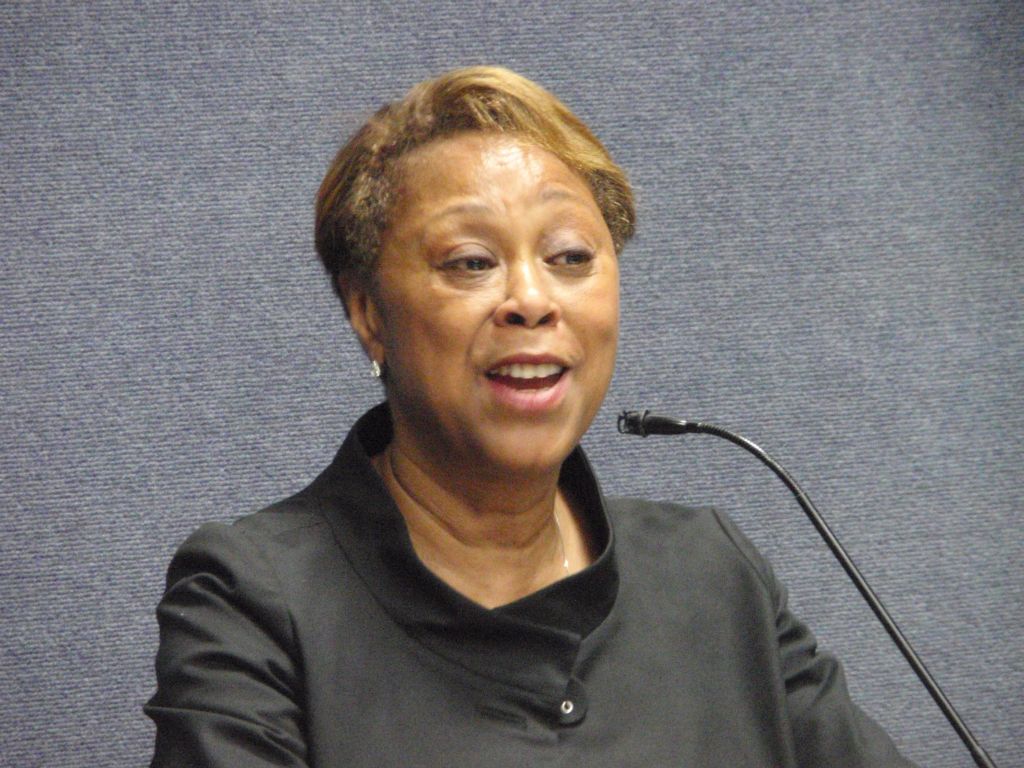
They have been chosen by their respective institutions to attend the 17th annual Summer Institute for Future Global Leaders in the Caribbean at the University of the Virgin Islands’ St. Thomas Campus.
The group got some insight about what those years could look like from a highly placed State Department official as the two-week institute kicked off Tuesday morning at the University’s Chase Auditorium.
“Be true to yourself,” Cheryl Benton, deputy assistant secretary of the Bureau of Public Affairs at the U.S. State Department, told the young people. She said they needed to be grounded in faith and connected to family in order to function effectively in “the most difficult and dynamic environment” they could work in.
Benton, who achieved her high-profile position by political appointment, having worked as co-chair of Women of Color for Hillary Clinton during her run for the White House, said her work at State has been “the most transforming time of my life.”
Benton said that, as a black woman, the work was particularly groundbreaking. “Ten years ago there was no one [at her level] who looked like me,” she said.
She found out, in a particularly edgy way, what it means to be a black woman doing State business on a recent trip to Azerbaijan when she was “stared down” by an Azerbaijani police officer.
“I stared back,” she said, adding that could have been dangerous in a repressive country where not one other black person was to be found during her stay.
Students on Tuesday seemed captivated by Benton’s address, still asking pertinent, well-informed questions as the hour allotted for the opening ceremony came to an end.
One question addressed the problem of simply passing money to developing nations with no control over where it ends up – most often in the pockets of corrupt politicians.
Benton said changes in policy that include working with civilians instead of governments had been made to stem the flow of millions of dollars into the wrong hands.
Though globalism is not a new concept—as pointed out by institute co-founder Ronald E. Harrigan—effecting change on a global level at a time of diminishing resources makes the prospect of global careers more challenging.
Benton was optimistic, however. She said even though the State Department receives only 1 percent of the total $3.5 trillion U.S. budget, the agency gets a lot done.
Benton also noted Secretary of Defense Robert Gates’ recent statement that as the wars in Iraq and Afghanistan wind down, the money allocated to those conflicts should be transferred to the State Department to bolster diplomatic and foreign aid efforts. USAID is the aid arm of the State Department, Benton said.
Her particular department is the "high-profile, answer-delivery system,” she said, adding that just like the White House, “We have our own press corps.”
Her team of 200 people has to be on top of world events 24-7, she said.
The U.S. government, she said, is involved in every spot in the world, and given the 24-hour news cycle, she said it is hard to keep up. Her team’s job is to “help manage global involvement at a time of high stress.”
But at the end of the day, she said, “We’re about the civilian society. Civilians go into countries after war and rebuild … society.”
The students—who have been chosen to spend the next two weeks in a crash course in such things as impromptu speaking, cross-cultural communications (including sign language and Chinese) and the challenge of substance abuse and HIV/AIDS in times of diminishing resources—will be expected to provide a detailed leadership prospectus by the time the intensive program ends.
Harrigan said the institute’s objective is to help these outstanding students set their goals and the specific path to reaching them before they leave. It works, he said. Harrigan said he still hears from former graduates who have been successful in finding their places in the world over the last 17 years.
Benton told the students, many of whom were eager to find out more, that the State Department provides substantial educational opportunities for young people interested in foreign service. Currently, 40,000 students are studying at the Bureau of Education and Cultural Affairs.
“Foreign service is for those who want to make a difference,” she said. “Every day you have to make a commitment to serve not only your community, but also your country.”